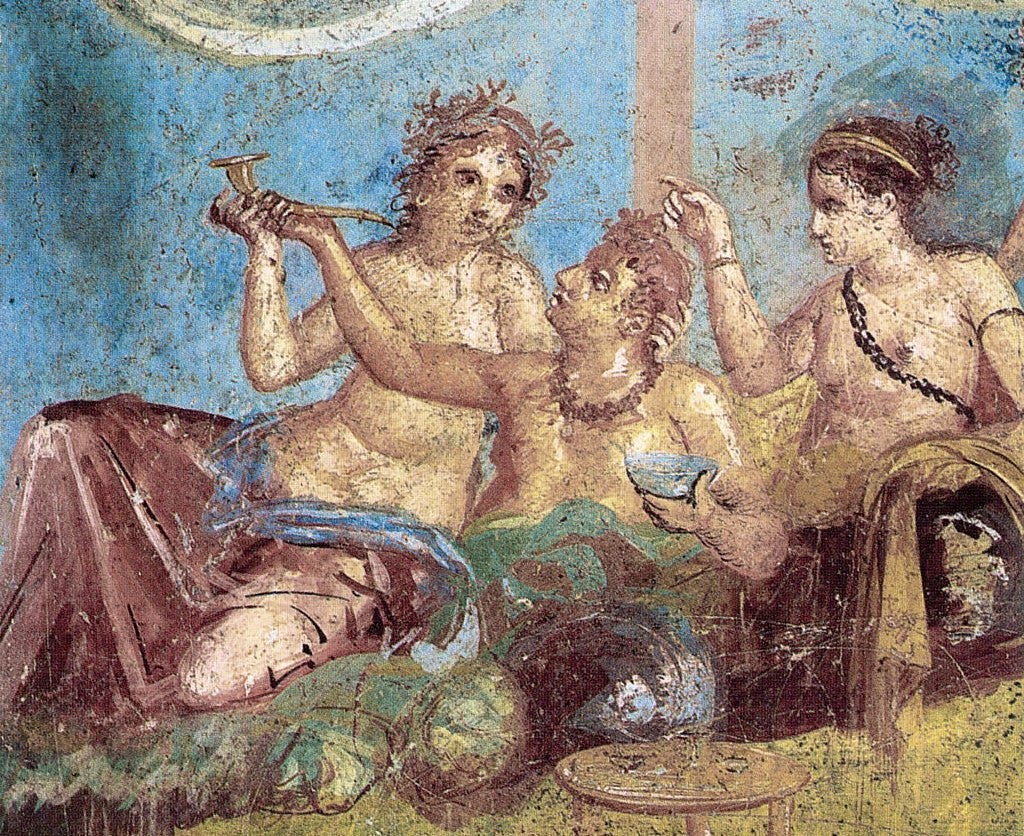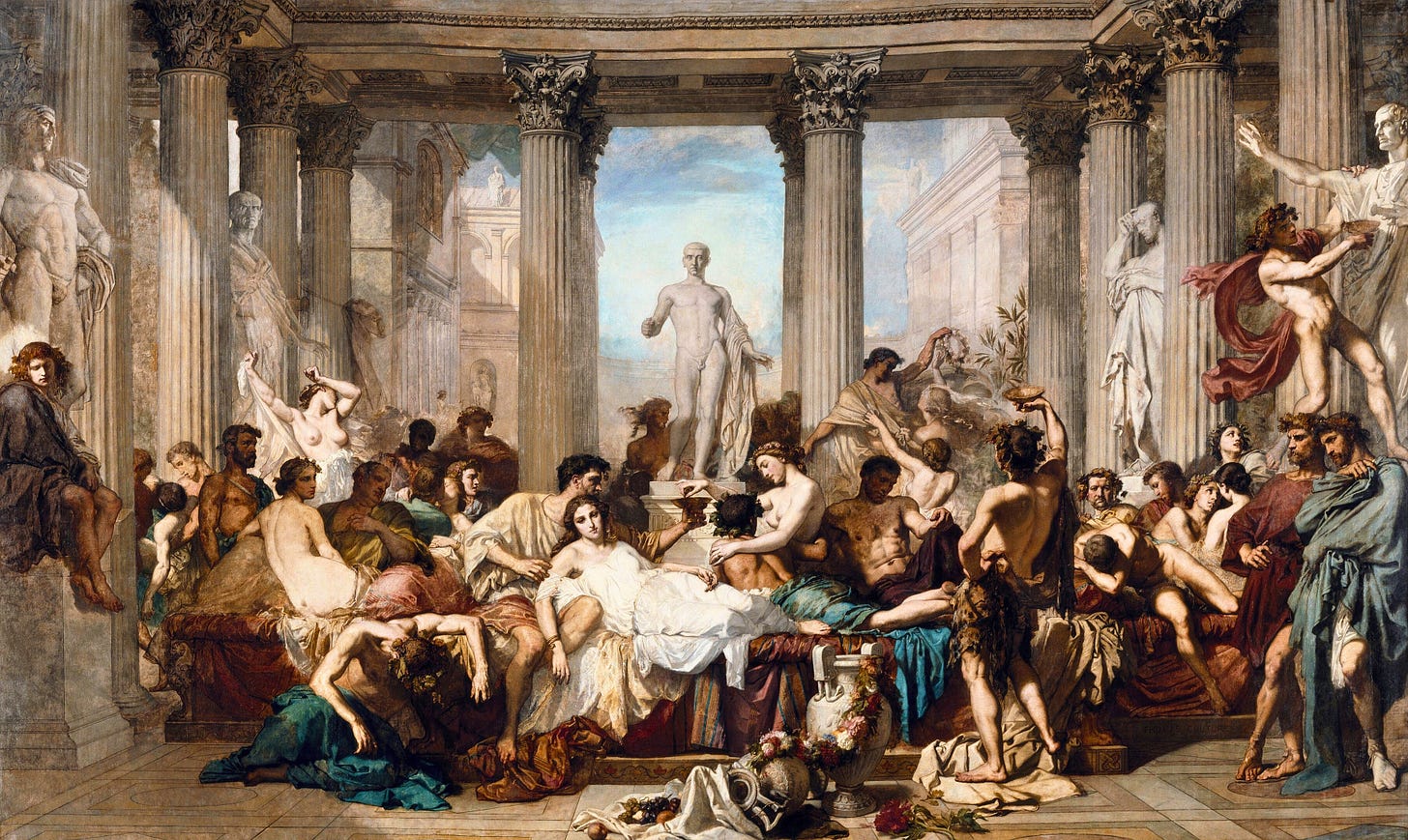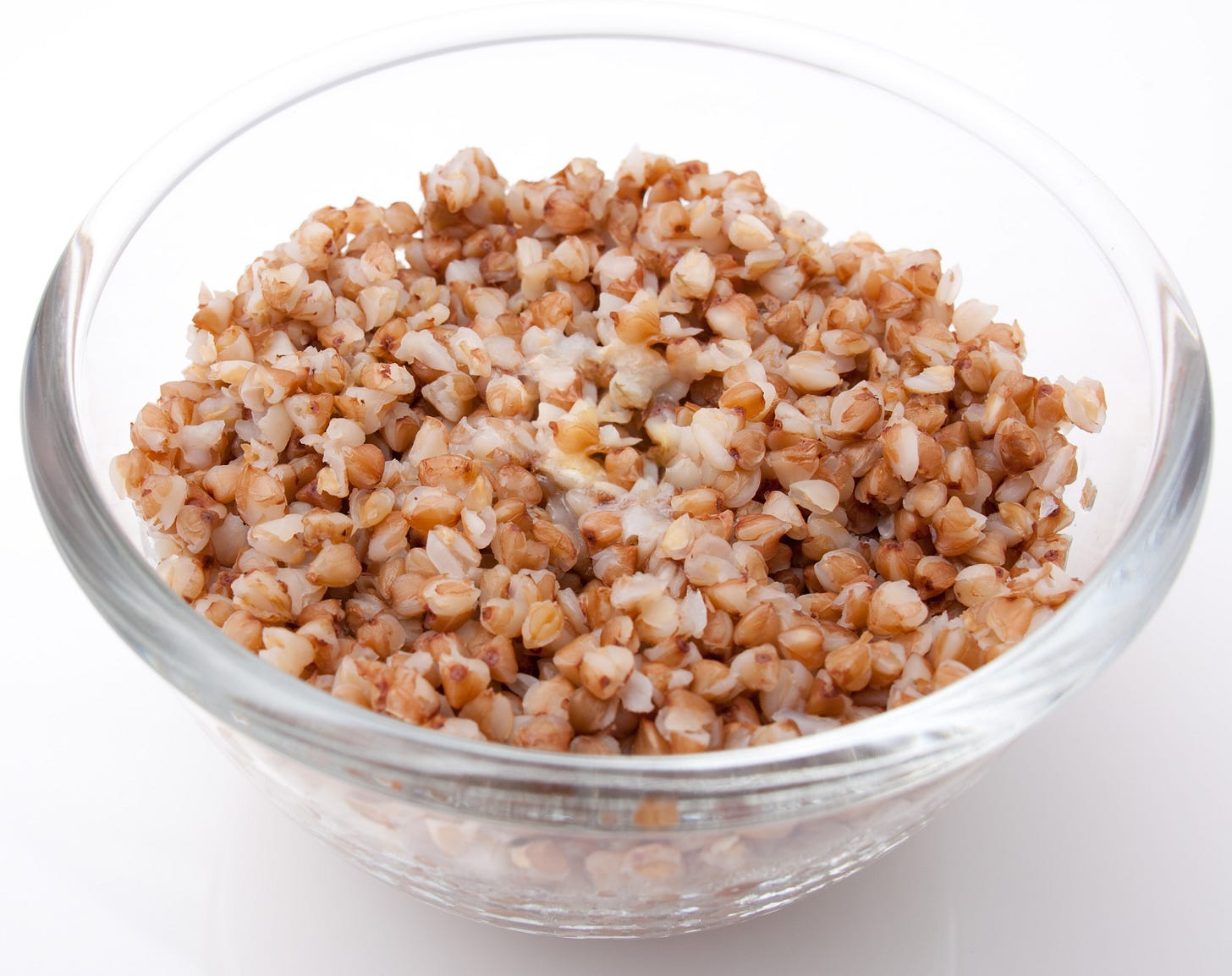“The more one has, the more one wants, since satisfactions received only stimulate instead of filling needs.” — Emile Durkheim, Suicide: A Study in Sociology.
“Nature abhors a vacuum.”
Aristotle observed this 2,300 years ago, and for humans, pleasure vacuums may be most abhorrent of all. Let go of harmful pleasures and you’ll probably relapse or fill the void with something else.
Well, most of the rich world is now wrapped up in unhealthy food tailored to maximize enjoyment rather than health. You don’t need me to tell you how that’s going. And when people try to give up this food, they often relapse because vacuums demand filling.
Everyone knows unhealthy diets hurt people, but the sirens sing so seductively on the rocks.
We’ve now reviewed the misconceptions about processed foods and obesity, and noted the Christians who believe health and dietary choices have moral weight, and end up dramatically slimmer and healthier as a result.
But is this insight of any use for the general population?
What I’d Like To Explore: Though we can’t snap our fingers and become religious believers, we don’t need to remain “dietary nihilists.” In fact, a better path — supported by modern psychological research — was laid out during the classical era. So let’s talk about filling the void with something better.
We’ve Been Here Before:
"We live for our bellies now, not our minds." — Juvenal, Satires, 11
We may be doomed to repeat the ancient world’s aristocratic mistakes, only scaled to all of humanity.
And yes, obesity and food. The ancient world shared this problem too.
While Rome’s teeming masses subsisted in good health on monotonous diets of puls porridge, beans, and vegetables, with some fish or cheese thrown in periodically, the wealthy Roman elite hoovered up fatty and sweet delicacies from the far reaches of the empire.
Their slave-cooks prepared elaborate feasts aimed not at fulfilling the body’s needs, but exciting the tongue.
But the patricians’ diet was killing them, and they knew it. Far from being paragons of excellence, many Roman aristocrats became bloated slobs hobbled by disease.
The physician Galen found it necessary to classify his many overfed patrician patients as either fleshy (sarkōdēs), obese (pachys), or morbidly obese (polysarkos) in De Methodo Medendi. The latter couldn’t walk without sweating, reach the table over their bellies, give birth healthfully, or clean themselves.
The disability or ill health of many of its best and brightest was a periodic problem for the Romans. For instance, after a string of crushing military victories, Pompey the Great returned to Rome. Finding peace boring, he threw himself into drinking and feasting with gusto (filling a void, you might say), put on weight, and became plagued by health problems. When called out of retirement to save the Republic from Julius Caesar, Pompey was so reduced in mind and body from years of overindulgence that he was outclassed by his famously dietarily disciplined opponent, who was still lean, energetic, and mentally acute.
Both men were in their fifth decade, but one had aged gracefully while the other had lost a few steps. The final battle came down to the wire — so maybe those lost steps doomed the Republic.
“The most wholesome nutriment for man is plain food. An accumulation of flavours is injurious, and still more so, if heightened by sauces.”
— Pliny the Elder, Natural History, 11.117
Variations on this story are found throughout Roman history. Several militarily effective emperors and generals developed gout so bad they couldn’t lead their armies. Sometimes disasters followed when they outsourced the work.
Thinkers like Pliny and Juvenal mocked the aristocratic diet and urged a return to the simpler foods of yore. Much like my clients found “peasant diets,” rewired their relationship with eating and led to health and weight loss, health-minded Romans suggested aristocrats eat like poor plebeians1.
But they ran into a problem every modern dietitian and doctor understands — no matter how many edifying examples they give, no matter how sound their logic, few listen. Take away exciting pleasure food and the vacuum yawns. Most will fail to fill it wisely and relapse.
And so, strangely enough, it was philosophers who stepped in with something to fill the vacuum.
Everyone Hates Philosophers:
“So when we say that pleasure is the goal, we do not mean the pleasure of decadent people…” — Epicurus, Letter to Menoeceus,
The classical world had a love-hate relationship with its philosophers. Emperors killed and exiled the ones who wouldn’t shut up about their high standards. They were often mocked. But they always had a following because unlike most of today’s philosophers, their ideas helped people navigate real-world problems.
And so a surprising amount of ancient diet philosophy survives, with thinkers coming at the subject from different directions.
Let’s talk about the two major schools during the Roman period.
The Epicureans:
We think of “epicureans” as dietary hedonists and pleasure seekers, but Epicurus was famously restrained in his eating. He appears to have mostly eaten barley porridge, bread, and vegetables, and his idea of a luxurious gift was his friend sending him a “pot of cheese.”
Why would a pleasure seeker choose less pleasurable foods? A simple cost-benefit calculation:
“…we do not choose every pleasure, but sometimes we pass over many pleasures, when greater discomfort accrues to us as the result of them.” — Epicurus, Letter to Menoeceus.
Those who know a little philosophy will recognize this as a forerunner of John Stuart Mill’s Utilitarianism, which suggests the moral thing to do in any situation is what maximizes pleasure or minimizes pain for the most people.
The West abandoned classical morality long ago, and even the religious seem content to discard many moral precepts. So Utilitarianism is the last moral framework standing in the sense that politicians and intellectuals vaguely reference its pleasure/pain model to justify policy. There’s still a veneer of the 10 commandments, but it’s thin.
Yet pleasure-pain equations are clearly not working on the eating front, since obesity and disease are rampant and only 20% of overweight and obese people who lose an average of 30 kg maintain their lower weight for even a year2.
As much as people enjoy and seek lean bodies, health isn’t enough to fill the vacuum opened by reduced food pleasure for most of them.
That’s where the Stoics come in.
The Stoics:
“Above all, my dear Lucilius, make this your business: learn how to feel joy.”
— Seneca, Letters, 23.3
Eighty percent of you will find what I’m about to say baffling, boring, or off-putting. Stick with me and we’ll get into specific strategies for the general public in the final piece of this series. This theory contextualizes those strategies.
So…Stoic morality is hard for modern people to wrap their heads around, since we’re used to morally judging results. The ends justify the means, and all that.
The Stoics thought this was misguided. After all, your actions can be impeded, so how can lack of achievement be morally bad? Similarly, a psychopath may accidentally do good, and doesn’t deserve praise.
Are you overweight, obese, or diabetic? The Stoics would agree these states are dispreferred but insist they carry no moral weight and say nothing morally about you. The past and whatever mistakes you made are gone. The future is yet to come. Now it is where your power lies.
When Stoics watch someone eating cake, a steak, or some durian, they don’t say it’s good or bad. For them, moral value lies in reasoned choice. What we say, do, think, and intend right now matters most. All morality is internal. All morality is now.
If a Stoic — fat or thin, vital or ridden with gout — chooses food and eats or abstains with as much wisdom, justice, courage, and moderation as they can perceive and muster in their circumstances, they’re on track, and might do even better next time. They called these four qualities the cardinal virtues, or simply virtue.
Stoics thought virtue was extremely significant, but it was more flexible than most moral systems, allowing reason and intention to lead, not dogma.
If a Stoic gets shipwrecked on a desert island with nothing but a 10-year supply of Ho Hos, then virtue might dictate the consumption of many Ho Hos3.
That doesn’t mean Stoics are without opinions, and many Stoic lectures were extended arguments for certain choices being best aligned with virtue. It was a big-tent philosophy, and practitioners often differed.
But all surviving Stoic writing agrees that many aristocratic diets were asinine and couldn’t be squared with virtue. They’d think the same about the average Western diet today. If they read what we know about heavily processed foods4, they’d say people are daft to eat it (circumstantially depending).
Filling The Pleasure Vacuum
The Stoics had a revolutionary realization — the pursuit of intrinsic meaning in every moment can replace the transitory, extrinsic pleasures humans get wrapped up in (like fast food).
Their solution to the yawning vacuum ripped open by avoidance of harmful pleasures was filling it with something intrinsically great — something that can never be taken away.
The virtue we bring to eating — and the rest of life — can lead to contentment and happiness. It adds rather than subtracts from our pleasure.
Musonius Rufus probably said it best:
“If one were to measure what is agreeable by the standard of pleasure, nothing would be pleasanter than self-control; and if one were to measure what is to be avoided by pain, nothing would be more painful than lack of self-control.”
— Musonius Rufus, Lectures and Fragments, Fragment 24,
You may think he’s deluded: Self-control, wisdom, justice, and courage aren’t pleasurable. They actually feel horrible.
I agreed with you when I encountered this idea 23 years ago. I was obese, plagued by an autoimmune condition, depressed, and generally saw life as a thing that happened to me. My litany of problems was ridiculous. When I read Meditations and saw Marcus Aurelius suggest virtue was all-important, I threw his notebook down in disgust.
Didn’t he understand that I was a victim? That life was unfair to me? That I had serious problems that virtue couldn’t solve?
I wrestled with this for years, but eventually had to conclude he was right.
I like pleasure, but when achieving pleasure and avoiding pain is the goal rather than the result of a well-run life, things usually get worse for me.
Asking “how can I bring virtue to this moment?” has never worsened my situation. Usually, it improves my life and makes me happy in a way young Andrew would have found unlikely.
So in short, Seneca was correct:
“…to proceed toward the happy life—let virtue go in front, and let pleasure follow…”
— Seneca, On the Happy Life, 13.5
How Virtue Becomes “Shiny”
Here’s where we bring in those healthy eating, lean Adventists bucking our obesity epidemic.
They stayed trim because they cast moral aspersions on what most westerners do — gleefully chase pleasure without thought to its effect on our bodies, minds, and communities. When they eat well they’re chasing an elevated connection.
This is hard to replicate if you’re not a believer. If you’re not, smart eating only gets you utility, and pleasure may trump it.
There’s no active creator god in Stoic philosophy, but ancient Stoics believed virtue was the most important thing because the universe was ordered by laws — a kind of pantheism. Humans were part of the universe, so they had a spark of divinity, and could participate in the divine order by acting with virtue. The creation of this alignment was good and pleasure and happiness usually followed.
Today…that’s not an easy sell.
In the modern Stoic revival:
“Traditional Stoics,” think Stoic “physics” is perfectly compatible with modern science (or maybe science is wrong about some things?). So virtue aligns with the providential ordered universe, and great things happen if they live virtuously. See Hadot’s Inner Citadel for the rationale.
“Modern Stoics,” think the opposite. Most strip out the Stoic pantheism and physics but believe virtue is so self-evidently good that the lack of a providentially ordered universe doesn’t matter. It’s still the best bet. See Irvine’s “Guide to the Good Life.” for a rough approximation of this argument (not exact).
“Hybrid Stoics,” argue mild tweaks to Stoic “physics” can keep virtue embedded in the universal order and aligned with modern science. I make no bold claims, but offer one possible way this argument can be made.
I personally find virtue’s benefits so self-evidently good (after many years of hard testing) that I agree with the Stoic paradox: “virtue is the only good.” But without “physics”, you lose the elevation and universal alignment aspect which makes it a harder sell.
The Back Door To Virtue:
In many years of coaching clients on health and weight loss, I never gave them the pitch for Stoicism or virtue — too hard of a sell. They were coming to me for weight loss, not “the good life.”
But I learned that there are some back doors to virtue consciousness that I could help them walk through, and the result was self-efficacy and improved outcomes.
So in my next piece, I’ll be talking about the strategies I found to enact the “theory,” I wrote about here.
Until then, you may want to read about a quick method for becoming intrinsically motivated to do things like lose weight and make changes:
Thanks for reading Socratic State of Mind.
If you liked this article, please like and share it, which helps more readers find my work.
Their critique was probably based on reality. Collagen testing of the skeletons at Herculaneum found some bones created by diets of mostly animal foods as well as many more created by grains, beans, and vegetable-heavy diets with some fish. The remains of poor laborers were noted as being robust and healthy their skeletons taller than 20th-century Italians from the Bay of Naples. So the diet scolds were probably correct. The plebians underclass was probably healthier than many aristocrats. See Wilkins and Nadeau, Food in the Ancient World, 111-12, and Wallace-Hadrill, Herculaneum: past and future, 129.
Wing RR, Hill JO. Successful weight loss maintenance. Annu Rev Nutr. 2001;21:323-41.
I just dreamed up this sentence and I think I’d prefer death. :)
Juul, F., Martinez-Steele, E., Parekh, N. et al. The role of ultra-processed food in obesity. Nat Rev Endocrinol (2025)










I just wanted to say thank you for this article. I have realized that the weight and health issues I struggle with are more than just the calories I consume. I was focused on the physical, not realizing the emotional factors. All the reading I have done and it was your article that helped me make the connection. Thank you so much, Andrew. Understanding "nature abhors a pleasure vacuum" versus what I grew up with (not adding the word pleasure to the quote) makes more sense to me now. And it helps me understand the world a bit better. And yes I do read the letters- in between the growing collection of books I read. Currently reading Heidegger's Being and Time, and re-learning German so I can understand him in his native tongue. Cheers.
I know this is about diet and eating, but this can easily be expanded to any activity we undertake. Really like your insight into the Stoic approach!